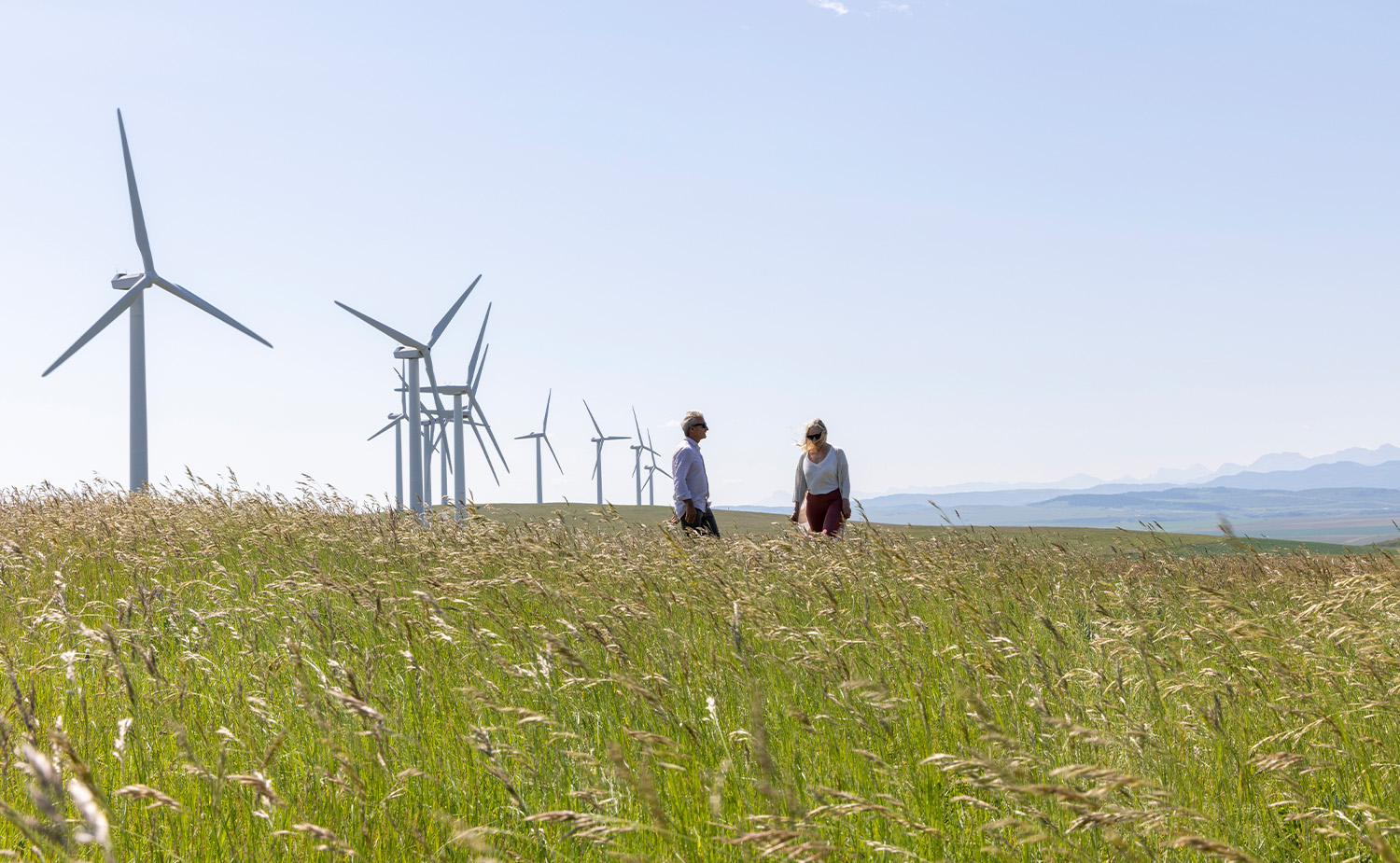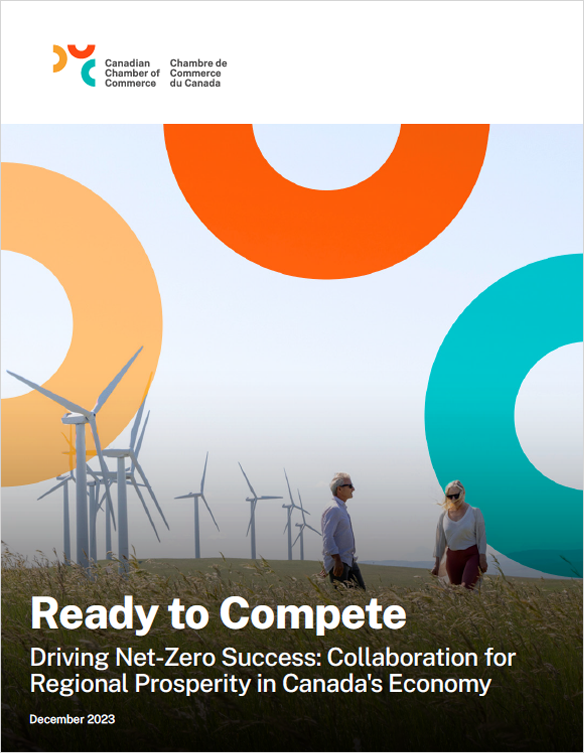Blog /
Driving Net-Zero Success: Highlights from the Ready to Compete Report
Driving Net-Zero Success: Highlights from the Ready to Compete Report
Canada’s ability to compete in the net-zero economy requires significant investment and commitment from Canadian businesses — but they cannot adapt alone.

The decisions made today, across all levels of government, will influence Canada’s future success in a net-zero world.
Canada’s ability to compete in the net-zero economy requires significant investment and commitment from Canadian businesses — but they cannot adapt alone. The federal government must facilitate the net-zero transition to ensure Canada’s pathway is competitive, enhances investment, creates jobs for Canadians and promotes innovation.
The Canadian Chamber of Commerce’s Net-Zero Council (NZC), in partnership with the University of Waterloo Terrametrics Research Lab, conducted research to identify investment, policy and regulatory priorities for four Canadian regions: Atlantic Canada, Ontario, Prairies and British Columbia.
The analysis focused on six key sectors: agriculture, electricity, transportation, buildings, natural resources and heavy industry. Based on the analysis, the study identified seven priorities that resonate across regions and sectors, and are critical to address if Canada is to prosper in a net-zero world:
- The need to act quickly.
- The need to increase public investment and support.
- The need to remove barriers for business.
- The need to mobilize and de-risk private investment.
- The need to prepare a net-zero workforce.
- The need to focus on Indigenous partnerships and reconciliation.
- The need to plan for regional differences and varying capacities.
Here are some of the key considerations from each of the four regional analyses.

Atlantic Canada
Renewable electricity generation is one of Atlantic Canada’s most significant challenges in its transition to net-zero. The region’s reliance on oil and natural gas as primary energy sources – and Novia Scotia and New Brunswick’s predominant use of coal for their electricity – are due in part to the rural nature of the provinces and the prevalence of offshore oil and gas drilling in Newfoundland.
Additionally, the four provinces have the highest rates of energy poverty in Canada, and costs are only expected to rise as the region begins to decarbonize their electricity grid in-line with federal net-zero targets. While affordable electricity is critical to ensure business competitiveness and increase investment in the region, there is also growing demand for renewable and net-zero electricity.
Despite a heavy reliance on fossil fuels for electricity, transportation, and other industries, Atlantic Canada is poised to develop and grow their competitive advantage in renewable energy. The region is well positioned to respond to predicted trends in slowing demand for fossil fuels by developing its capacity for on and offshore wind energy, small modular reactor (SMR) nuclear technology, green hydrogen, and hydroelectricity.

Ontario
In 2021, Ontario had the largest provincial share of farms and farm operators in the country, and many were small- to medium-sized enterprises (SMEs) whose growth, competitiveness and ability to adapt to a net-zero economy directly impacts the livelihood and wellbeing of Canadians.
Ontario farm operators have already shown leadership and willingness to implement sustainable practices made possible by sectoral innovation, federal funding and provincial regulatory changes. This demonstrated interest aligns with growing national and global demand for sustainable agri-food products throughout the supply chain. To achieve net-zero emissions and protect Ontario agricultural exports, there must be increased development and implementation of technologies that reduce the footprint of vehicles and equipment through fuel switching, increase methane capture from livestock, and use agricultural soil as a carbon capture, use, and storage (CCUS) mechanism, among others.
Significant efforts must also be directed towards protecting Ontario farmland from development, which will secure the longevity of agricultural SMEs and protect Ontario’s agri-food supply chain.

Prairies
Regulatory uncertainty and regulatory burden are limiting private sector and global investment, especially regarding oil and gas, power infrastructure, and pipelines. Regulations are being implemented without coordination and consideration of cumulative impacts on regions, sectors and industry. Investors want regulatory certainty and clear policy directives. Regulations cannot compromise global competitiveness, especially for trade sensitive industries.
Building the necessary infrastructure needed to meet net-zero targets requires changes to speed up regulatory processes. Fast tracking permitting, reducing regulatory hurdles, and streamlining provincial and federal environmental assessment processes will encourage global investments and advance major infrastructure projects more quickly. Existing regulatory processes are too cumbersome and lengthy.
Development of new natural resource-based projects must include Indigenous partnerships or be Indigenous-led. A collaborative, Indigenous-focused approach to resource development and renewable energy generation provides for own-source revenue generation opportunities for First Nation communities and businesses. The development of an energy transition workforce strategy can help ensure a skilled workforce is ready. Priority should be directed to help retrain workers in declining industries.

British Columbia
British Columbia is a well-recognized leader in establishing bold regulations for the production and sale of zero-emission vehicles (ZEVs) for passenger, medium and heavy-duty vehicles, and associated infrastructural developments. Additionally, its abundant supply of hydroelectricity provides a near-net-zero energy source.
However, investment in ZEV infrastructure varies greatly across geographies and access to ZEVs remains prohibitively expensive for a large portion of the province. If British Columbia is to fully transition from fossil fuel-reliant private vehicles to ZEVs, targeted public subsidies and private investment de-risking initiatives must be implemented to ensure equitable access to ZEV technology.
Similarly, while accelerating the adoption of ZEVs for personal and freight use will lower emissions and help British Columbia achieve its emissions reduction targets, more economic and political emphasis must be directed towards shifting consumer behaviour from private vehicles to public transportation, especially in urban areas where these systems and supporting infrastructure are already established. Doing so will relieve pressure on ZEV suppliers and infrastructure, provide more affordable and accessible options for transportation, and support a long-term shift in how individuals, businesses, and industries conceptualize transportation.
Overall, the report found that the capacity to decarbonize is not equal across the country and that the federal government must provide flexible solutions to support regional approaches, as opposed to a one-size-fits-all. For the full, in-depth analysis:
Other Blogs

Policy Matters: What Does the U.S. Have to Do with Canada’s Manufacturing Sector?

Why Mining Companies Have Become More Sustainable and Inclusive to Stay Relevant





